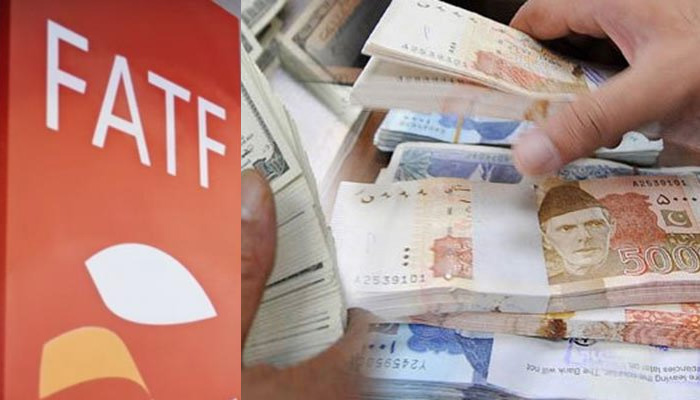Pakistan briefs FATF about steps against money laundering
ISLAMABAD: Despite expressing 14 major concerns by a visiting 6-member delegation of the Asia Pacific Group (APG) of Financial Action Task Force (FATF), Pakistan has explained its measures undertaken by law enforcing agencies on money laundering as they registered 1,111 cases, seized Rs02 billion, arrested 1,466 accused and secured 254 convictions in last three years from 1-1-2015 to 11-6-2018.
The visiting APG delegation raised concern that absence of dedicated inter-ministerial focus group and lack of coordination among the Centre and provinces was causing problems to come up with an effective plan and its execution against elements involved in money laundering and terror financing.
The visiting APG delegation of continued deliberations with Pakistani authorities here on Wednesday but caretaker Minister for Finance Dr Shamshad Akhtar did not meet the visiting delegation as she preferred to travel to Lahore and expected to return to Islamabad on Friday (tomorrow) when the delegation would depart from Islamabad. The delegation, according to the sources, held meeting with the finance secretary and other Finance Ministry high-ups, but the caretaker finance minister did not prefer to meet the visiting APG delegates in last three days.
David Shannon, Principle Executive Officer, had undertaken a visit of Pakistan in last April to brief Pakistani authorities on the FATF plan of action and way forward. In the light of his guidelines, Pakistan prepared action plan with timeframe to come out from the grey list. If APG does not satisfy then Islamabad might slip into blacklist which should not happen at all, so all departments and institutions will have to work jointly in the best interest of the country.
The visiting APG delegations handed over 14 major concerns to Islamabad’s authorities apprising them that the country’s understanding of terror financing risk was limited and targeted financial sanctions against militants and militias against Haqaani Network, al-Qaeda, ISIS and Taliban; however, actions against UN listed entities (JUD, FIF,LET, JeM, ISIS, HQN0 was lacking.
They pointed out that there were large numbers of terrorism cases but very few on account of terror financing, so Pakistan would have to enhance its capacity on this front. It was also pointed out that the Counter Terrorism departments (CTDs) were inconsistent, so the federal and provincial coordination was also weak. They also pointed out that effectiveness and sustainability of actions relating to taking over of assets of listed entities, identification of more assets of listed identities recruitments of staff etc and specific references for entities and scope enhanced from JuD (Jamatud Dawa) and Falah-e-Insaniat (FIF).
The Federal Investigation Agency (FIA) and its Counter Terrorism Wing received 60 Suspicious Transaction Reports (STRs), out of which seven were related to terrorist outfits. Two inquiries were closedown and five were still underway. Since the National Action Plan (NAP), the LEAs has confiscated Rs10.9 million as efforts were made to smuggle out this money from the country.
Now the APG delegation would conclude its findings and way forward on Thursday (today), and Islamabad will have to put up whole efforts to convince the FATF and APG for coming out from the grey list in coming months. Now, another delegation was expected to evaluate performance in October and final in January 2019 to come out from any further down gradation on front of FATF ranking.
-
 Trump Revokes Legal Basis For US Climate Regulation, Curb Vehicle Emission Standards
Trump Revokes Legal Basis For US Climate Regulation, Curb Vehicle Emission Standards -
 DOJ Blocks Trump Administration From Cutting $600M In Public Health Funds
DOJ Blocks Trump Administration From Cutting $600M In Public Health Funds -
 2026 Winter Olympics Men Figure Skating: Malinin Eyes Quadruple Axel, After Banned Backflip
2026 Winter Olympics Men Figure Skating: Malinin Eyes Quadruple Axel, After Banned Backflip -
 Scientists Find Strange Solar System That Breaks Planet Formation Rules
Scientists Find Strange Solar System That Breaks Planet Formation Rules -
 Meghan Markle Rallies Behind Brooklyn Beckham Amid Explosive Family Drama
Meghan Markle Rallies Behind Brooklyn Beckham Amid Explosive Family Drama -
 Backstreet Boys Voice Desire To Headline 2027's Super Bowl Halftime Show
Backstreet Boys Voice Desire To Headline 2027's Super Bowl Halftime Show -
 OpenAI Accuses China’s DeepSeek Of Replicating US Models To Train Its AI
OpenAI Accuses China’s DeepSeek Of Replicating US Models To Train Its AI -
 Woman Calls Press ‘vultures’ Outside Nancy Guthrie’s Home After Tense Standoff
Woman Calls Press ‘vultures’ Outside Nancy Guthrie’s Home After Tense Standoff -
 Allison Holker Gets Engaged To Adam Edmunds After Two Years Of Dating
Allison Holker Gets Engaged To Adam Edmunds After Two Years Of Dating -
 Prince William Prioritises Monarchy’s Future Over Family Ties In Andrew Crisis
Prince William Prioritises Monarchy’s Future Over Family Ties In Andrew Crisis -
 Timothée Chalamet Turns Head On The 'show With Good Lighting'
Timothée Chalamet Turns Head On The 'show With Good Lighting' -
 Bucks Vs Thunder: Nikola Topic Makes NBA Debut As Milwaukee Wins Big
Bucks Vs Thunder: Nikola Topic Makes NBA Debut As Milwaukee Wins Big -
 King Charles Breaks 'never Complain, Never Explain' Rule Over Andrew's £12 Million Problem
King Charles Breaks 'never Complain, Never Explain' Rule Over Andrew's £12 Million Problem -
 Casey Wasserman To Remain LA Olympics Chair Despite Ghislaine Maxwell Ties
Casey Wasserman To Remain LA Olympics Chair Despite Ghislaine Maxwell Ties -
 Shaun White Is Back At The Olympics But Not Competing: Here’s Why
Shaun White Is Back At The Olympics But Not Competing: Here’s Why -
 Breezy Johnson Engaged At Olympics After Emotional Finish Line Proposal
Breezy Johnson Engaged At Olympics After Emotional Finish Line Proposal




